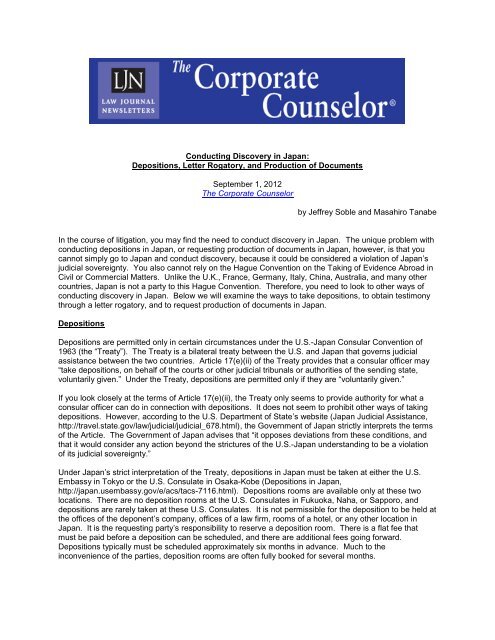Depositions, Letter Rogatory, and Production of ... - Foley.com
Depositions, Letter Rogatory, and Production of ... - Foley.com
Depositions, Letter Rogatory, and Production of ... - Foley.com
You also want an ePaper? Increase the reach of your titles
YUMPU automatically turns print PDFs into web optimized ePapers that Google loves.
Conducting Discovery in Japan:<strong>Depositions</strong>, <strong>Letter</strong> <strong>Rogatory</strong>, <strong>and</strong> <strong>Production</strong> <strong>of</strong> DocumentsSeptember 1, 2012The Corporate Counselorby Jeffrey Soble <strong>and</strong> Masahiro TanabeIn the course <strong>of</strong> litigation, you may find the need to conduct discovery in Japan. The unique problem withconducting depositions in Japan, or requesting production <strong>of</strong> documents in Japan, however, is that youcannot simply go to Japan <strong>and</strong> conduct discovery, because it could be considered a violation <strong>of</strong> Japan’sjudicial sovereignty. You also cannot rely on the Hague Convention on the Taking <strong>of</strong> Evidence Abroad inCivil or Commercial Matters. Unlike the U.K., France, Germany, Italy, China, Australia, <strong>and</strong> many othercountries, Japan is not a party to this Hague Convention. Therefore, you need to look to other ways <strong>of</strong>conducting discovery in Japan. Below we will examine the ways to take depositions, to obtain testimonythrough a letter rogatory, <strong>and</strong> to request production <strong>of</strong> documents in Japan.<strong>Depositions</strong><strong>Depositions</strong> are permitted only in certain circumstances under the U.S.-Japan Consular Convention <strong>of</strong>1963 (the “Treaty”). The Treaty is a bilateral treaty between the U.S. <strong>and</strong> Japan that governs judicialassistance between the two countries. Article 17(e)(ii) <strong>of</strong> the Treaty provides that a consular <strong>of</strong>ficer may“take depositions, on behalf <strong>of</strong> the courts or other judicial tribunals or authorities <strong>of</strong> the sending state,voluntarily given.” Under the Treaty, depositions are permitted only if they are “voluntarily given.”If you look closely at the terms <strong>of</strong> Article 17(e)(ii), the Treaty only seems to provide authority for what aconsular <strong>of</strong>ficer can do in connection with depositions. It does not seem to prohibit other ways <strong>of</strong> takingdepositions. However, according to the U.S. Department <strong>of</strong> State’s website (Japan Judicial Assistance,http://travel.state.gov/law/judicial/judicial_678.html), the Government <strong>of</strong> Japan strictly interprets the terms<strong>of</strong> the Article. The Government <strong>of</strong> Japan advises that “it opposes deviations from these conditions, <strong>and</strong>that it would consider any action beyond the strictures <strong>of</strong> the U.S.-Japan underst<strong>and</strong>ing to be a violation<strong>of</strong> its judicial sovereignty.”Under Japan’s strict interpretation <strong>of</strong> the Treaty, depositions in Japan must be taken at either the U.S.Embassy in Tokyo or the U.S. Consulate in Osaka-Kobe (<strong>Depositions</strong> in Japan,http://japan.usembassy.gov/e/acs/tacs-7116.html). <strong>Depositions</strong> rooms are available only at these twolocations. There are no deposition rooms at the U.S. Consulates in Fukuoka, Naha, or Sapporo, <strong>and</strong>depositions are rarely taken at these U.S. Consulates. It is not permissible for the deposition to be held atthe <strong>of</strong>fices <strong>of</strong> the deponent’s <strong>com</strong>pany, <strong>of</strong>fices <strong>of</strong> a law firm, rooms <strong>of</strong> a hotel, or any other location inJapan. It is the requesting party’s responsibility to reserve a deposition room. There is a flat fee thatmust be paid before a deposition can be scheduled, <strong>and</strong> there are additional fees going forward.<strong>Depositions</strong> typically must be scheduled approximately six months in advance. Much to theinconvenience <strong>of</strong> the parties, deposition rooms are <strong>of</strong>ten fully booked for several months.
After you reserve a deposition room, you must carefully plan in advance. It is the parties’ responsibility tomake necessary logistical arrangements. You must schedule the appearance <strong>of</strong> deponents. You mustmake arrangements for court reporters, stenographers, or interpreters. You must obtain a SpecialDeposition visa to enter Japan <strong>and</strong> participate in the deposition. This Special Deposition visa must beapplied for at least two weeks before departure for Japan. You cannot take a deposition via telephone orvideoconference, absent specific authorization from the Japanese Ministry <strong>of</strong> Foreign Affairs. Thus, allparticipants must be physically present at the deposition. While Japan once allowed a live videoteleconferencedeposition (see U.S. v. Nippon Paper Industries, Co., Ltd., Order (D. Mass., July 28, 1998),the Government made clear that this should not be considered a precedent. Videotaping <strong>of</strong> thedeposition is permitted. The U.S. Embassy or the U.S. Consulate does not, though, provide you withtapes, taping equipment, or equipment operators. You must make all arrangements with the video-takingservice providers. To bring equipment to the deposition room, you must make prior arrangements withthe U.S. Embassy or the U.S. Consulate.Once you are in the deposition room to take the deposition, the presiding consular <strong>of</strong>ficer will typicallyadminister oaths to the deponent, interpreters, <strong>and</strong> stenographers. The consular <strong>of</strong>ficer will then usuallywithdraw. The requesting counsel will then start the actual questions. The deposition must occur duringthe hours <strong>of</strong> 8:30 a.m. to 1:00 p.m., <strong>and</strong> 2:00 p.m. to 4:00 p.m. All participants must vacate the depositionroom between 1:00 p.m. <strong>and</strong> 2:00 p.m. The deposition room at the U.S. Embassy seats approximatelyeight persons.Article 17(e)(ii) <strong>of</strong> the Treaty provides that a consular <strong>of</strong>ficer may take depositions “in accordance with thelaws <strong>of</strong> the sending state.” Thus, U.S. law applies to the depositions. U.S.-qualified attorneys canparticipate in the depositions, <strong>and</strong> the deponent may claim privileges under U.S. law.<strong>Letter</strong> <strong>Rogatory</strong>Under the Treaty, depositions can be taken only if they are “voluntarily given.” There may be cases,though, where the deponent does not agree to “voluntarily give” a deposition. In such a case, therequesting party could consider requesting the U.S. court to issue a court order known as a “letterrogatory.” A letter rogatory is a request from a court in one country for assistance from a court in anothercountry. It can be used to <strong>com</strong>pel a Japanese witness to appear before a Japanese judge <strong>and</strong> givetestimony. <strong>Letter</strong>s rogatory are not, however, a very popular method <strong>of</strong> obtaining testimony from awitness. The execution <strong>of</strong> letters rogatory by Japanese courts can be time-consuming, taking six monthsto a year to execute in some cases.Once a letter rogatory is issued, it will be transmitted through diplomatic channels. The letter rogatorymust attach a Japanese translation <strong>of</strong> the letter rogatory <strong>and</strong> all <strong>of</strong> its attachments. It will ultimately endup in the Japanese district court that has jurisdiction over the witness. Then the Japanese district courtwill <strong>com</strong>pel the witness to appear before a Japanese judge to respond to written questions annexed to theletter rogatory. The judge will question the witness in accordance with procedures called a “witnessexamination (shounin jinmon)” under Japanese law. After questioning the witness, the Japanese judgewill prepare an <strong>of</strong>ficial document as a record <strong>of</strong> the “witness examination.” This document will be inJapanese <strong>and</strong> will include the testimony given by the witness. The Japanese court will then send thedocument back to the U.S. court.Japanese law applies to the procedures in connection with the execution <strong>of</strong> letters rogatory. Only Japanqualifiedattorneys (bengoshi) can represent clients in the courts. U.S. attorneys are generally notpermitted to sit in the attorney seats. They can only sit in the visitor seats. On a case-by-case basis,however, the Japanese judge may permit U.S. attorneys to participate in the procedures. For theseprocedures, U.S. attorneys do not need to obtain Special Deposition visas. The witness may claim “rightto refuse testimony (shougen kyozetsu ken)” under Japanese law. The “right to refuse testimony” is2
witness’ right to refuse testimony on matters specified under law, such as “matters concerning technicalor pr<strong>of</strong>essional secrets.” Typically, “technical secrets” would include technology-related know-how, <strong>and</strong>“pr<strong>of</strong>essional secrets” would include product cost <strong>and</strong> customer lists. If the witness claims privilegesunder U.S. law, the Japanese courts will likely make a record <strong>of</strong> such claim <strong>and</strong> defer to the U.S. courts.<strong>Production</strong> <strong>of</strong> DocumentsIn the U.S., you can <strong>com</strong>pel production <strong>of</strong> documents even from a third party if you have a subpoena.You cannot, however, do that for a third party in Japan. Doing so could be considered a violation <strong>of</strong>Japan’s judicial sovereignty.So again, you must look into the Treaty. Article 17(1)(f) <strong>of</strong> the Treaty provides that a consular <strong>of</strong>ficer may“obtain copies <strong>of</strong> or extracts from documents <strong>of</strong> public registry.” Under the Treaty, the consular <strong>of</strong>ficercan only obtain documents <strong>of</strong> public registry. The consular <strong>of</strong>ficer cannot obtain other documents, suchas those in the h<strong>and</strong>s <strong>of</strong> a third party.Now, you might try using the letter rogatory. In the past, various parties have tried using the lettersrogatory to <strong>com</strong>pel production <strong>of</strong> documents in Japan. Unfortunately, this usually does not work. This isdue to provisions <strong>of</strong> the Civil Procedures Code <strong>of</strong> Japan. Under the Code, the Japanese judge whoassists the execution <strong>of</strong> the letter rogatory has the authority to examine a witness, but does not have theauthority to order production <strong>of</strong> documents. In accordance with the Code, the Japanese judge will likelynot allow a request for production <strong>of</strong> documents even if so written in the letter rogatory. As a result, theonly way to obtain documents in Japan from a third party in Japan would be to ask that third party to“voluntarily” produce the documents.ConclusionConducting discovery in Japan is not easy <strong>and</strong> litigants should not expect to obtain nearly the samequantity or quality <strong>of</strong> information from Japan. However, if you know the available discovery devices <strong>and</strong>the special procedures to take advantage <strong>of</strong> those devices, discovery may not be lost. Only if youunderst<strong>and</strong> the distinct rules <strong>and</strong> limitations, will you be able to effectively <strong>and</strong> smoothly conductdiscovery in Japan.Jeffrey Soble is a partner in <strong>Foley</strong> & Lardner LLP's Chicago <strong>of</strong>fice <strong>and</strong> co-chair <strong>of</strong> the AutomotiveIndustry Team. His practice focuses on class action defense, post-transaction disputes, products liability,construction losses, <strong>and</strong> general contract <strong>and</strong> tort law. Masahiro Tanabe is a New York <strong>and</strong> Japanqualified attorney in <strong>Foley</strong> & Lardner LLP's Tokyo <strong>of</strong>fice. A member <strong>of</strong> the Automotive Industry Team, Mr.Tanabe’s practice focuses on cross-border business transactions <strong>and</strong> disputes.3




